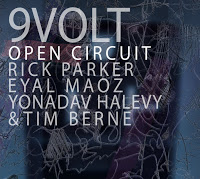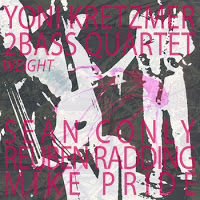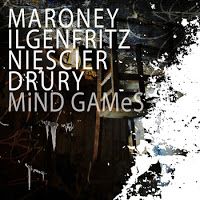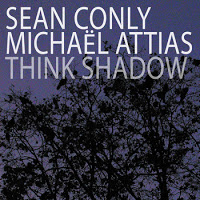A write up of some recent releases from the label OutNow has been on my mind for a bit of time now. After catching an exciting release event at Shapeshifter in Brooklyn in late November I’ve been digging into this batch, enjoying immensely…
Guitarist Eyal Maoz appeared recently on Shanir Ezra Blumenkranz’s Abraxas recording as a part of a dual team of guitarists and with Bryan Beninghoves’ Hangmen as a part of another dual team. In the trio configuration of 9Volt (or quartet with guest Tim Berne), he is front and center – so to speak – though all three members seem to sit equally in the mix.
Starting with ‘Squeege,’ Maoz’s guitar is a deep rumble of distorted harmonic motion while trombonist Rick Parker and guest saxophonist Tim Berne’s angular lines intertwine. The reedy alto and the rounded tones of the trombone mix delightfully with Parker’s additional electronics effects. Drummer Yonadav Halevy is a sympathetic listener and a supportive player throughout.
One of OutNow label owners, Yoni Kretzmer, is the tenor sax player in this group, along with bassists Sean Conly and Reuben Redding, and drummer Mike Pride. This free form group presents a captivating set of songs on Weight. The tandem playing of Conly and Redding is enjoyable, as the two bassists work together to create pulse, texture and melodies. Kretchmer’s sax playing erupts from deep within and it’s pure and arresting. His split tone climax at the apex of ‘Number One’ is chilling in intensity and quality.
By Dan Sorrells
Duos can be tough. Bass and sax are a tried-and-true pairing, but the strength of any meeting between the two rides on the imagination and rapport of the players, as the limited timbral variety can quickly grow tiresome. Think Shadow, the duo of alto and baritone saxophonist Michäel Attias and bassist Sean Conly, straddles the line between excitement and drabness. Conly has a flashy, busy pizzicato style which, when first brought out in full force on “Rabid in the Boneyard Blue,” is exhilarating. However, over the course of nearly an hour, the blur of mid-range notes begins to feel a bit numbing. Attias is a worthy adversary too, though he takes a more relaxed approach on Think Shadow than on some of his excellent Clean Feed albums. Sometimes the slow-burners are incredibly effective, such as “Sloe Mink,” but as the album trundles on at the same tempo and dynamic range, I’m left wondering why there can’t be more ear-grabbers like the spiraling, wrenching sax on “Baghdad Bargain.” Think Shadow is pleasant enough, but there are stronger examples out there of what these two are capable of.





